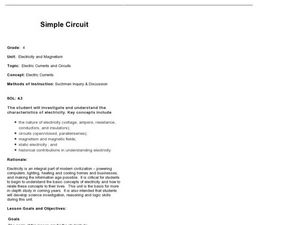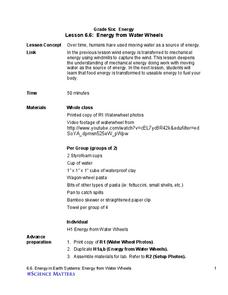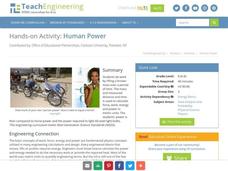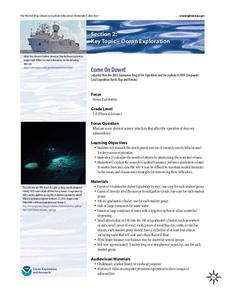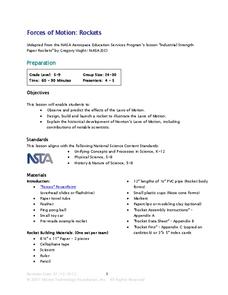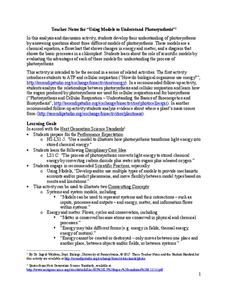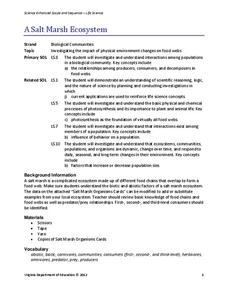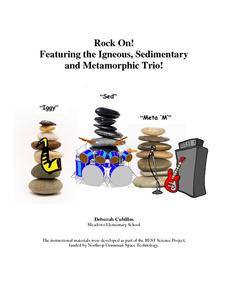Science Matters
Forms of Energy
The amount of energy Americans use doubles every 20 years. The first lesson in a 10-part series teaches scholars about different forms of energy. They rotate through five stations with hands-on activities or experiments at each in order...
Science Matters
Solar Energy
The solar energy industry in the United States added more jobs in 2015 than the oil and gas extraction and pipeline industries combined. With the field growing so rapidly, it's essential to understand what solar energy is and how it...
Science Matters
Thermal Energy Flow in Materials
The sun sends the earth 35,000 times the amount of energy required by all of us on the entire planet, every day. The fourth lesson in the 10-part series looks at how light energy from the sun transfers into thermal energy. Scholars build...
Curated OER
Simple Circuit: Electric Currents and Circuits
Through inquiry and exploration, 4th graders will learn and understand the functions of open and closed circuits. They will break into 2 groups, define vocabulary, hypothesize how to light a bulb, then test their hypothesis 4 different...
Science Matters
Energy from Water Wheels
Historians believe the first vertical water wheel was invented in Rome during the Augustan Age. The sixth lesson in the series of 10 has scholars experiment with designing their own water wheels. Through testing various pastas and...
Teach Engineering
Human Power
How many humans does it take to power a light bulb? The 10th part of a 25-lesson Energy Systems and Solutions unit has learners conduct an experiment to calculate power. They then use the results to determine how many classmates they...
Curated OER
Great Rivers 2: The Ups and Downs of River Flooding
Second in a three-part lesson on rivers, this lesson focuses on the flooding that occurs in riparian locations. First, learners take a look at facts about the Amazon River. They read online materials and fill in a worksheet as they...
Curated OER
Urban Ecosystems 4: Metabolism of Urban Ecosystems
Cities are compared to living, breathing, metabolizing organisms. Fourth in a five-part series of lessons, this one focuses on the flow of materials through a city. Links to interesting websites and images make your delivery of...
Captain Planet Foundation
Sorting Out Soils
Sift through soil and learn about why it's important for organic processes. After discussing what makes up soil, such as the living organisms and what types of soil have more nutrients, kids sample layers of mulch and deeper soil to...
Consortium for Ocean Science Exploration and Engagement (COSEE)
Arctic Smorgasbord
Though the walrus spends roughly one third of its time on land, it eats organisms that live on the bottom of the ocean. The first in a series of five, the lesson uses a variety of plant and animal cards to have scholars build an arctic...
NOAA
Come on Down!
What do we do when a dive is too dangerous for humans to accomplish? Send in the robots! Middle school scientists get acquainted with several different models of submersible robots in the second lesson of six from NOAA. Lab groups then...
NOAA
What Little Herc Saw
See the underwater world through a different pair of eyes! Middle school marine biologists identify deep-sea organisms by examining images taken by an ROV from the Okeanos Explorer. After determining what creatures lie beneath the...
Curated OER
Everything You Ever Wanted To Know About Hot Wire Chemical Vapor Deposition, But Were Afraid To Ask
To wrap up your year of general chemistry, have lab groups compete in a tot wire chemical vapor deposition (HWCVD) competition. With their foundation in chemical nomenclature, stoichiometry, and gas laws, each group completes several...
Howard Hughes Medical Institute
Got Lactase? The Co-Evolution of Genes and Culture
Does the human body evolve as quickly as human culture? With a stellar 15-minute video, explore the trait of lactose intolerance. Only about 1/3 of human adults seem to still have the enzyme lactase and therefore, the ability to digest...
Micron Technology Foundation
Forces of Motion: Rockets
Young scientists design a rocket to launch using Newton's Laws of Motion in order to discover for themselves the forces of motion.
Royal Society of Chemistry
Equilibria—Gifted and Talented Chemistry
Teaching is a balancing act! Keep things on an even keel with a comprehensive equilibrium lesson plan. The resource covers reversible and irreversible reactions, Le Chatelier's Principle, and the industrial applications of equilibrium...
Serendip
Using Models to Understand Photosynthesis
Is your class in the dark about photosynthesis? Shed some sunlight on an important biological process with a thoughtful activity. After answering questions to help determine their level of knowledge, learners work with chemical equations...
Virginia Department of Education
A Salt Marsh Ecosystem
What a web we weave. Pupils use yarn as the primary resource to create a web depicting the intricacies of a salt marsh ecosystem. They participate in a question and answer session, which leads to an in-depth facilitated discussion about...
National Nanotechnology Infrastructure Network
Is Measuring an Art or a Science?
Not only do future engineers learn the difference between accuracy and precision, they also get some hands-on experience using different measuring tools.
Virginia Department of Education
Classification of Organisms
Searching for the perfect indoor/outdoor activity that allows class members the opportunity to learn about organism classification? Here, pupils research organisms and categorize them according to domain and kingdom over the course of...
Star Wars in the Classroom
Star Wars Geography Unit
What kind of animals live on an ice planet like Hoth? How would the habitat on Tatooine allow different organisms to thrive? Connect social studies, science, and Star Wars in one engaging activity that focuses on the ecosystems of the...
Curated OER
Rock On! Featuring the Igneous, Sedimentary and Metamorphic Trio!
Get your classroom rocking with this four-lesson earth science unit. Through a series of shared reading activities and hands-on investigations, young geologists learn about the three types of rocks and the unique properties of each.
Salt River Project
How Do We Clean Polluted Water?
How do we clean up oil spills and other pollutants in the water? Explore water treatment strategies with a set of environmental science experiments. Groups remove oil from water, work with wastewater treatment, and perform a water...
Virginia Department of Education
Go with the Flow
How does nature's hierarchy relate to our local human environment? Answer this question, along with others, as the class visually depicts the natural hierarchy provided by nature. Pupils discuss each piece of the pyramid and its energy...
Other popular searches
- Physics Concepts Momentum
- Physics Concepts on Pressure
- Physics Concepts Motion
- Physics Concepts Force
- Physics Concepts Light
- Physics Concepts 24
- Different Physics Concepts
- Physics Concepts Flight





